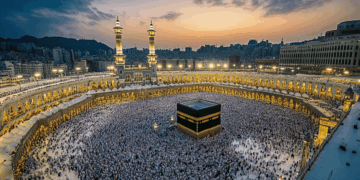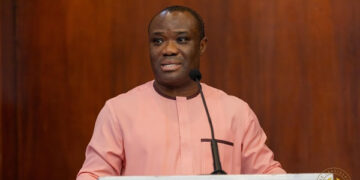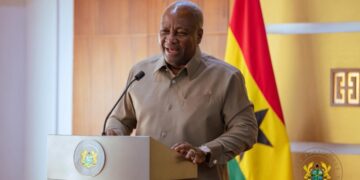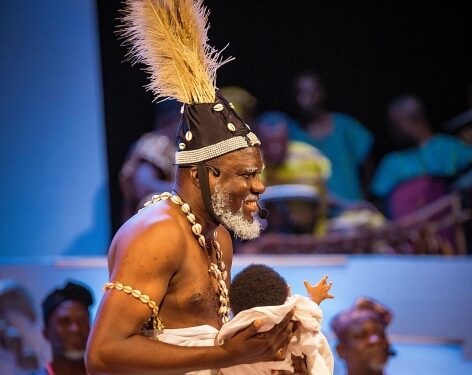PERHAPS, for the majority of patrons who thronged the National Theatre to watch The Gods Are Not to Blame on Sunday, December 3, the story was a familiar one from back in the years.
The play was also staged the previous day, December 2.
However, not even one’s familiarity with the popular drama, which is an adaptation of Sophocles’ original Greek piece Oedipus Rex by Nigeria’s Ola Rotimi, could prevent one from staying glued to his seat throughout the over two-and-a-half-hour production.
The opening scene of a well-coordinated choreography piqued the interest of patrons from the beginning. Meanwhile, the interest shifted to a higher level when veteran actor David Dontoh, as narrator, took patrons through the plot of the play.
The Gods Are Not to Blame is a sad tale of Odewale, destined to kill his father King Adetusa of Kutuje and marry his own mother, Queen Ojuola, which was played by actress Naa Ashorkor.
As the first child and in fulfilment of custom, the royal couple went to find out the destiny of their child Odewale from the priest of Ifa, Baba Fakunle, a blind soothsayer played by renowned theatre director and actor Mawuli Semevo.
Baba Fakunle pronounced the fate of Odewale as a messenger of the gods sent to kill his father and marry his mother. He, however, disclosed that the only way to avert the taboo was to kill the baby.
The Ogun priest, played by Fred Amugi, then tied the legs of the baby, as a sign that he was cursed, and ordered the king’s messenger, Gbonka, to go kill him in the forest.
Filled with compassion, Gbonka spared the life of the innocent baby and gave him to Ogundele, a hunter he met in the forest.
That was, therefore, the beginning of the prophecy of the gods, which saw Odewale go through all the phases of life and play into the gallery of the gods because of his hot temper.
This hot temper drove him out of his adopted parents’ home when a relative boldly told him he was a butterfly thinking himself a bird.
This same hot temper caused him to kill an old man who turned out to be King Adetusa, his biological father, during an argument over ownership of a piece of farmland.
As the gods willed his destiny, Odewale found himself in Kutuje after 32 years and led the people to fight their enemies in war.
The people of Kutuje defy tradition and crowned a stranger (Odewale) king, for leading them to win a battle. King Odewale married his mother, Queen Ojuole, bringing to fulfilment the prophecy of the gods.
They gave birth to four children—Adwale, Adebie, Oyeyemi and Adeyinka. However, the joy of the people of Kutuje was short-lived when they were hit with plagues.
Aderopo, the second son of King Adetusa and Queen Ojuola, was sent to consult the priest of Ifa, who told them the murderer of their former King was living peacefully with them, thus the cause of their predicament.
Read Also:Clashes kill 75 near Sudan-South Sudan border – UN
Performances
Scene after scene, the actors brought their A-game on. For instance, one of the best scenes was when the priest of Ifa, Baba Fakunle, was brought to the palace to tell King Odewale and his sub-chiefs the cause of their curse.
The exchange between Baba Fakunle and King Odewale played by actor Andrew Tandoh Adote is worth commending.
It was an epic scene that got patrons applauding for a long, with the raw display of emotions by both characters. Indeed, the insult of Baba Fakunle to King Odewale as a bed sharer will certainly stay in the minds of patrons.
Besides, Naa Ashorkor’s (Queen Ojuola) cry of pain and betrayal from the gods, upon learning the truth and the fulfilment of the prophecy of the gods, was emotional.
The dead silence in the auditorium spoke volumes of how patrons, with some teary, related to her pain of marrying her own son and bearing children by him; a big taboo.
Just as King Odewale said in the last scene, indeed the ‘gods are not to blame’, since they only use the weaknesses of men. In his case, the gods used his hot temper to fulfil their doom prophecy over his life.
The standing ovation at the end of the play showed just how much theatre lovers appreciated the quality of production of The Gods Are Not to Blame, which was a collaboration among the National Theatre, George Quaye’s Image Bureau and Naa Ashorkor’s April Communications.
SOURCE:GRAPHICONLINE



























